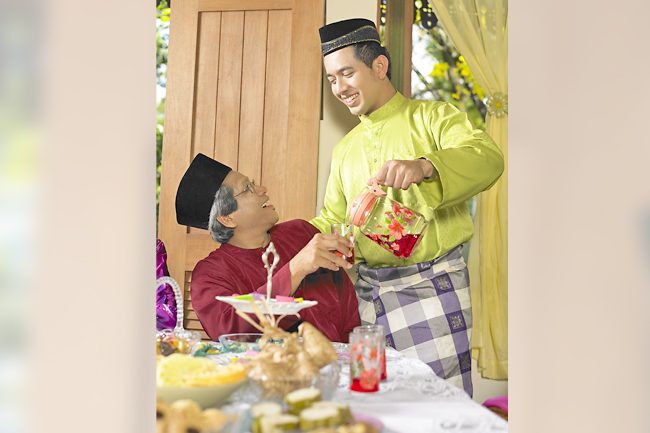Celebrate diversity and unity through respectful communication this festive season
As the anticipation for Hari Raya Aidilfitri builds and families gear up for the festivities, it’s crucial to consider the impact of our conversations with guests or those we meet when visiting relatives’ and friends’ homes during the celebration.
While we eagerly anticipate coming together to revel in unity and harmony, it’s important to acknowledge that everyone may be navigating personal challenges behind the scenes.
Keeping this in mind, let’s highlight some topics to avoid to ensure we approach conversations with thoughtfulness and empathy.

THE WEIGHT COMMENT
Let’s take a moment and really realise the sensitivity surrounding comments about a person’s weight and the challenges they may face on their health journey, whether they’ve gained or lost a significant amount of weight.
These intentions may be well-meaning, discussing someone’s weight can be deeply personal and may inadvertently contribute to feelings of shame or insecurity.
Instead of focusing on outward appearances, prioritise support and encouragement for individuals as they navigate their health journey. By fostering an environment of acceptance and understanding, we can empower others to prioritise their well-being without judgement or scrutiny.
THE ‘ARE YOU WORKING YET?’ COMMENT
Discussing an individual’s job, salary, or career choices during family gatherings can often tread into sensitive territory.
I know these questions may stem from genuine curiosity or a desire to connect, they can inadvertently create discomfort or embarrassment for the person being asked. Inquiring about someone’s job or salary may touch upon personal insecurities or challenges they may be facing in their professional life.
Moreover, individuals may have varied experiences and feelings about their career paths, making such conversations potentially fraught with judgement or comparison.
I’m looking at those aunties who like to compare the achievements of other people’s children with their own.
Family gatherings are precious moments meant for fostering warmth, connection, and support among loved ones.
Rather than delving into sensitive topics like jobs and salaries, these gatherings should serve as opportunities to celebrate each other’s achievements, interests and passions.
By engaging in uplifting conversations that highlight the unique talents and joys of each family member, we can cultivate a more inclusive and positive atmosphere where everyone feels valued and respected.

THE ‘WHEN ARE YOU GETTING MARRIED?’ COMMENT
Though these questions may be asked innocently, they can evoke feelings of pressure, inadequacy or discomfort for individuals who may not have met societal expectations or personal timelines.
Respect for personal boundaries and life choices is paramount, as everyone’s journey to partnership is unique and may not align with traditional norms. Instead of probing into someone’s romantic life, once again, we should foster supportive and inclusive conversations that celebrate individuality and respect personal decisions regarding relationships and marriage.
This principle applies equally to individuals who have experienced divorce.
Inquiring about their marital status or relationship status post-divorce can also trigger feelings of discomfort or vulnerability.
Its high-time we approach these conversations with sensitivity and refrain from making assumptions about their experiences or decisions.
Even if your curiosity is piqued, it’s best to prioritise respect by allowing individuals to share their stories on their own terms, when they feel comfortable.
Pressuring them to divulge personal details prematurely can create discomfort and strain in the relationship. In its place, practicing patience and understanding demonstrates your respect for their boundaries and autonomy.

THE ‘ARE YOU PREGNANT YET?’ OR ‘WHY DON’T YOU ADD ANOTHER?’ COMMENTS
Conversations about pregnancy and adding more children can be sensitive topics, as they may not take into account the complexities and challenges individuals or couples may face.
The idea of expanding one’s family is often viewed as a joyous occasion. Recognise that factors such as financial constraints in this day and age, medical conditions like PCOS (Polycystic Ovary Syndrome), the rising cost of living and the stress of daily life can profoundly impact a person’s decision.
For some, the financial strain of raising another child or the emotional toll of dealing with infertility issues can be overwhelming. Moreover, struggling to raise just one child can already present its own set of challenges, ranging from balancing work and childcare responsibilities to managing mental and emotional well-being.
I’ve had an aunt suggest that I should have more children, unaware that I’ve gone through a divorce. Sometimes, it feels as though some people view having children as simply collecting Pokémon.
Hence, I know we can’t stress this enough, but surely we’re at a timeline where we can actually logically approach discussions about pregnancy and family planning with empathy and understanding, considering the unique and valid circumstances of each individual.
And since we’re on the topic of children, it’s also important to acknowledge the diversity of parenting styles and the importance of refraining from judgement. Just as one size does not fit all in various aspects of life, the same applies to parenting.
Each child is unique, with their own set of needs and personalities, requiring tailored approaches to caregiving. Criticising or imposing one’s own parenting beliefs onto others overlooks the complexities and nuances of raising children.
For example, you wouldn’t know if a child has autism or Attention-Deficit/Hyperactivity Disorder (ADHD) most of the time until a parent or family member tells you they do. So, let’s hold back on those judgy stares too.
However, there is one thing that needs to be instilled in children, especially those who are neurotypical, from a very young age – values of gratitude and humility, and teaching them not to feel entitled and to appreciate the gifts they receive.
One common tradition during festive occasions is the giving of green money packets, symbolising blessings and good fortune. However, constantly asking for these packets can foster a sense of entitlement and diminish the true meaning behind the gesture.
By teaching children the importance of being grateful for whatever they receive, regardless of its monetary value, we help them develop a deeper understanding of generosity and appreciation.

APPRECIATION
Lastly, it’s imperative to recognise and appreciate the efforts of those around us who contribute to the joy and celebration of this occasion. Whether it’s family members preparing delicious traditional dishes, friends organising gatherings, or neighbours decorating their homes with festive lights, everyone’s efforts add to the vibrancy of the festivities.
Taking the time to express gratitude for these contributions fosters a sense of camaraderie and strengthens the bonds within our community.
Whether through a heartfelt thank-you, a thoughtful gesture, or simply lending a helping hand, showing appreciation for people’s efforts enriches the spirit of Hari Raya and reinforces the values of kindness and generosity that define this special time of year.
It’s crucial to acknowledge the diversity of blessings, or rezeki, that each person experiences in life. As we traverse our individual journeys, we encounter a myriad of opportunities, obstacles, and circumstances that shape our paths in unique ways. Comparing our blessings or fortunes to those of others often breeds feelings of inadequacy or envy.
Let us all try embracing the richness of our varied experiences and understanding that each person’s journey is distinct that can cultivate a mindset of gratitude and contentment. By appreciating our own blessings and showing respect for the journeys of others, we foster empathy and understanding in our interactions, strengthening our relationships and nurturing a more cohesive community. – IZAH AZAHARI





